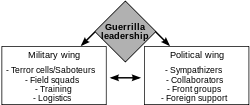Unconventional warfare
| Part of a series on |
| War Outline |
|---|
 |
Unconventional warfare (abbreviated UW) is the opposite of conventional warfare. Where conventional warfare is used to reduce an opponent's military capability, unconventional warfare is an attempt to achieve military victory through acquiescence, capitulation, or clandestine support for one side of an existing conflict.
On the surface, UW contrasts with conventional warfare in that forces or objectives are covert or not well-defined, tactics and weapons intensify environments of subversion or intimidation, and the general or long-term goals are coercive or subversive to a political body.
Objectives
The general objective of unconventional warfare is to instill a belief that peace and security are not possible without compromise or concession. Specific objectives include inducement of war weariness, curtailment of civilian standards of living and civil liberties associated with greater security demands, economic hardship linked to the costs of war; hopelessness to defend against assaults, fear, depression, and disintegration of morale.
The ultimate goal of this type of warfare is to motivate an enemy to stop attacking or resisting even if it has the ability to continue. Failing this, a secondary objective can be to emasculate the enemy before a conventional attack.
Methods and organization
Unconventional warfare targets civilian population psychologically to win hearts and minds, and only targets military and political bodies directly, seeking to render the military proficiency of the enemy irrelevant. Limited conventional warfare tactics can be used unconventionally to demonstrate might and power, rather than to substantially reduce the enemy's ability to fight. In addition to the surgical application of traditional weapons, other armaments that specifically target military can be used are: atomic weapons, urban incendiary devices, or other such weapons.
Special Forces, inserted deep behind an enemy's front lines, are used unconventionally to train, equip and advise locals who seek to change their oppressive regimes. They can also spread subversion and propaganda, while they aid native resistance fighters, to ultimately cause a hostile government to capitulate. Tactics focus on destroying military targets while avoiding damage to civilian infrastructure and blockading military resupply are used to decrease the morale of government forces.
Definitions

The United States Department of Defense defines UW as a broad spectrum of military and paramilitary operations, normally of long duration, predominantly conducted through, with, or by indigenous or surrogate forces who are organized, trained, equipped, supported, and directed in varying degrees by an external source. It includes, but is not limited to, guerrilla warfare, subversion, sabotage, intelligence activities, and unconventional assisted recovery. Organization varies by culture and type of conflict.
In the People's Wars conflicts of Vietnam and China, a clear structure of rural bases, different troop types and leadership by a strong centralized political group or party prevailed. In other conflicts the pattern is more fragmented, and unconventional warfare need not rely on rural bases at all. Generally, organization is divided into political or military wings.
See also
- Asymmetric warfare
- Fourth generation warfare
- Irregular military
- Irregular Warfare
- Low intensity conflict
- Partisan (military)
- Political Warfare
- Psychological warfare
- Resistance movement
- Terrorism
- Unrestricted Warfare
- A seminal work on unconventional stay-behind warfare is Major Hans von Dach's Der Totale Widerstand (Total Resistance (book)).
US & NATO specific:
External links
- Insurgency Research Group - Multi-expert blog dedicated to the study of insurgency and the development of counter-insurgency policy.
- Allied war terminology (File #5a)
- goarmy.com/special_forces/unconventional_warfare
- Unconventional Warfare: Definitions from 1950 to the Present [dead link]
- Instruments of Statecraft: U.S. Guerrilla Warfare, Counterinsurgency, and Counterterrorism, 1940-1990
- Pentagon plans cyber-insect army
